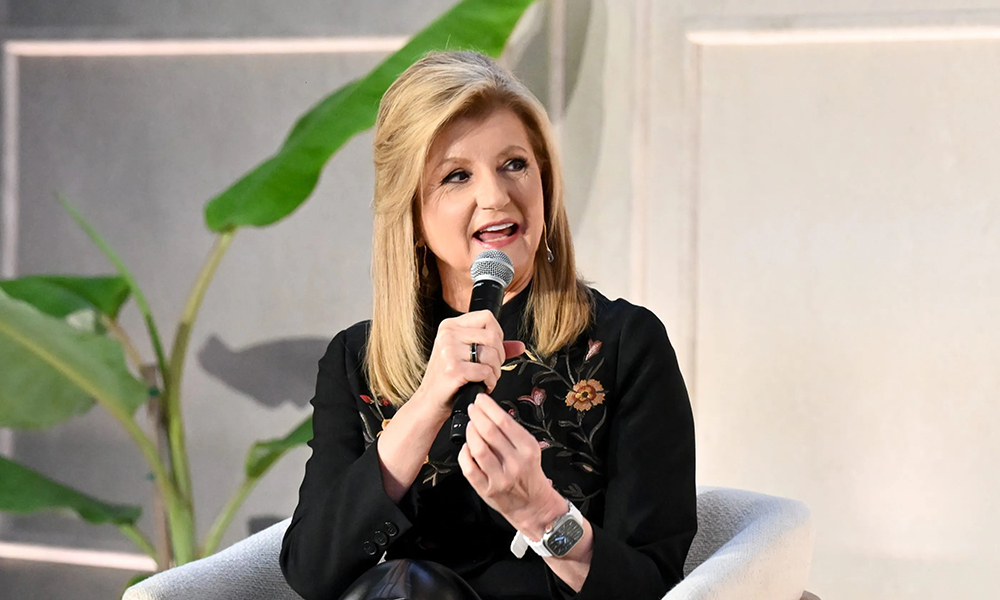
關于人工智能將如何掀起醫療保健行業的革命,有各種各樣的猜測。醫療健康領域的思想領袖們迫切希望看到,人工智能如何最大程度減少醫療保健從業者的倦怠和人手不足問題。有人正在探索除了在診所內的應用外,人工智能如何為日益增多的老齡化人口提供支持,減少慢性病流行,并改善生活質量。
OpenAI的山姆·阿爾特曼和Thrive Global的艾蓮娜·赫芬頓將合作尋找人工智能解決方案,為1.3億確診患有至少一種慢性疾病的美國人提供支持。
周一,OpenAI創業基金(OpenAI Startup Fund)和Thrive Global宣布投資成立Thrive AI Health公司。該公司將開發一款人工智能健康教練,可參考人類的生物特征和生活方式習慣,提供個性化的健康建議。這款人工智能教練將基于科學數據,并使用Thrive的行為改變方法論進行訓練,以改變微習慣為中心。
行為改變平臺Thrive Global的創始人兼CEO赫芬頓對《財富》雜志表示:“我們通常會從生產力的角度談論人工智能,認為它能讓人類從繁重的工作中解脫出來。人工智能當然有非常重要的應用。但歸根結底,關鍵在于人工智能如何從根本上改善我們的健康和延長壽命。如果你將人工智能看作是一種新政,通過推動有形基礎設施來改造國家和普及福利,那么人工智能就可以作為一個關鍵基礎設施的一部分,在更有效的醫療保健系統中持續為普通人提供支持。”
該公司任命前谷歌(Google)高管德卡洛斯·勒夫擔任Thrive AI Health的CEO。勒夫在可穿戴技術和產品開發方面擁有豐富經驗。
勒夫在宣布成立該公司的新聞稿中表示:“最近人工智能技術的發展創造了一個前所未有的機會,使行為改變變得更加有力和可持續。”
赫芬頓表示,她樂觀地認為人工智能通過吸納大數據集、識別模式和提供個性化的建議,有潛力成為“改變行為的關鍵”。她認為,僅僅泛泛地給人們制定走10,000步的目標或者建議地中海飲食,這是遠遠不夠的。她說道:“現在我們有機會使用人工智能這種行為改變的‘靈丹妙藥’。我們需要將只有1%的人知道和實踐的做法推而廣之。”
新平臺的人工智能健康教練能夠在睡眠、飲食、健身、壓力管理和社交聯系方面提供個性化建議。用戶可以自愿向健康教練提供健康信息,包括睡覺時間、喜歡的食物和減壓方式等個人偏好。
赫芬頓表示:“我們知道,當人們看到價值之后,就會愿意分享。”
她認為,隨著時間的推移,當人們看到產品的好處時,就會建立起信任和責任心。
赫芬頓和阿爾特曼在《時代》雜志的一篇專欄文章中寫道:“想象一下一名患有糖尿病的忙碌的職場人士的生活。你可能很難控制自己的血糖,而且因為緊張的日程安排經常沒有時間吃飯和鍛煉。個性化的人工智能健康教練,使用你的醫療數據和日常生活進行訓練,可以及時提醒你吃藥,提供快速健康的膳食選擇,并鼓勵你短暫休息進行鍛煉。”
隨著人工智能干預措施的廣泛推廣,健康公平成為人們普遍關注的問題。Thrive AI Health攜手人口健康與醫學教授、紐約大學朗格尼健康公平卓越研究所(NYU Langone’s Institute for Excellence in Health Equity)主任格本加·阿金納格貝博士,在缺醫少藥、更有可能面臨慢性病風險的人群中,對產品進行測試和迭代。
赫芬頓說道:“我們永遠無法為這些群體提供足夠多的人類健康教練。人工智能為我們提供了規模化和精準化的可能性。”但該公司仍需要克服與數據泄露和安全漏洞有關的普遍擔憂。
全球規模最大的網絡安全會議的執行主席休·湯普森博士在《財富》雜志中寫道:“問題是現在許多人工智能技術都是新技術,而管理新興風險的適當補充控制措施才剛剛形成。”新聞稿顯示,Thrive AI Health將擁有“強大的隱私和安全防護措施”。
該平臺的團隊將快速行動,定制和測試其產品,希望未來它的產品能夠成為健康基礎設施的支柱。愛麗絲·L·沃爾頓基金會(Alice L. Walton Foundation)是該平臺的投資者之一,該平臺還與研究和學術機構建立了合作,以幫助推廣其服務,包括斯坦福醫學中心(Stanford Medicine)和西弗吉尼亞大學(West Virginia University)洛克菲勒研究所(Rockefeller Neuroscience Institute)。該平臺的產品將提供給Thrive Global的雇主群體,并通過自保雇主和制藥公司擴大應用規模。(財富中文網)
翻譯:劉進龍
審校:汪皓
關于人工智能將如何掀起醫療保健行業的革命,有各種各樣的猜測。醫療健康領域的思想領袖們迫切希望看到,人工智能如何最大程度減少醫療保健從業者的倦怠和人手不足問題。有人正在探索除了在診所內的應用外,人工智能如何為日益增多的老齡化人口提供支持,減少慢性病流行,并改善生活質量。
OpenAI的山姆·阿爾特曼和Thrive Global的艾蓮娜·赫芬頓將合作尋找人工智能解決方案,為1.3億確診患有至少一種慢性疾病的美國人提供支持。
周一,OpenAI創業基金(OpenAI Startup Fund)和Thrive Global宣布投資成立Thrive AI Health公司。該公司將開發一款人工智能健康教練,可參考人類的生物特征和生活方式習慣,提供個性化的健康建議。這款人工智能教練將基于科學數據,并使用Thrive的行為改變方法論進行訓練,以改變微習慣為中心。
行為改變平臺Thrive Global的創始人兼CEO赫芬頓對《財富》雜志表示:“我們通常會從生產力的角度談論人工智能,認為它能讓人類從繁重的工作中解脫出來。人工智能當然有非常重要的應用。但歸根結底,關鍵在于人工智能如何從根本上改善我們的健康和延長壽命。如果你將人工智能看作是一種新政,通過推動有形基礎設施來改造國家和普及福利,那么人工智能就可以作為一個關鍵基礎設施的一部分,在更有效的醫療保健系統中持續為普通人提供支持。”
該公司任命前谷歌(Google)高管德卡洛斯·勒夫擔任Thrive AI Health的CEO。勒夫在可穿戴技術和產品開發方面擁有豐富經驗。
勒夫在宣布成立該公司的新聞稿中表示:“最近人工智能技術的發展創造了一個前所未有的機會,使行為改變變得更加有力和可持續。”
赫芬頓表示,她樂觀地認為人工智能通過吸納大數據集、識別模式和提供個性化的建議,有潛力成為“改變行為的關鍵”。她認為,僅僅泛泛地給人們制定走10,000步的目標或者建議地中海飲食,這是遠遠不夠的。她說道:“現在我們有機會使用人工智能這種行為改變的‘靈丹妙藥’。我們需要將只有1%的人知道和實踐的做法推而廣之。”
新平臺的人工智能健康教練能夠在睡眠、飲食、健身、壓力管理和社交聯系方面提供個性化建議。用戶可以自愿向健康教練提供健康信息,包括睡覺時間、喜歡的食物和減壓方式等個人偏好。
赫芬頓表示:“我們知道,當人們看到價值之后,就會愿意分享。”
她認為,隨著時間的推移,當人們看到產品的好處時,就會建立起信任和責任心。
赫芬頓和阿爾特曼在《時代》雜志的一篇專欄文章中寫道:“想象一下一名患有糖尿病的忙碌的職場人士的生活。你可能很難控制自己的血糖,而且因為緊張的日程安排經常沒有時間吃飯和鍛煉。個性化的人工智能健康教練,使用你的醫療數據和日常生活進行訓練,可以及時提醒你吃藥,提供快速健康的膳食選擇,并鼓勵你短暫休息進行鍛煉。”
隨著人工智能干預措施的廣泛推廣,健康公平成為人們普遍關注的問題。Thrive AI Health攜手人口健康與醫學教授、紐約大學朗格尼健康公平卓越研究所(NYU Langone’s Institute for Excellence in Health Equity)主任格本加·阿金納格貝博士,在缺醫少藥、更有可能面臨慢性病風險的人群中,對產品進行測試和迭代。
赫芬頓說道:“我們永遠無法為這些群體提供足夠多的人類健康教練。人工智能為我們提供了規模化和精準化的可能性。”但該公司仍需要克服與數據泄露和安全漏洞有關的普遍擔憂。
全球規模最大的網絡安全會議的執行主席休·湯普森博士在《財富》雜志中寫道:“問題是現在許多人工智能技術都是新技術,而管理新興風險的適當補充控制措施才剛剛形成。”新聞稿顯示,Thrive AI Health將擁有“強大的隱私和安全防護措施”。
該平臺的團隊將快速行動,定制和測試其產品,希望未來它的產品能夠成為健康基礎設施的支柱。愛麗絲·L·沃爾頓基金會(Alice L. Walton Foundation)是該平臺的投資者之一,該平臺還與研究和學術機構建立了合作,以幫助推廣其服務,包括斯坦福醫學中心(Stanford Medicine)和西弗吉尼亞大學(West Virginia University)洛克菲勒研究所(Rockefeller Neuroscience Institute)。該平臺的產品將提供給Thrive Global的雇主群體,并通過自保雇主和制藥公司擴大應用規模。(財富中文網)
翻譯:劉進龍
審校:汪皓
There’s a lot of speculation about how artificial intelligence can revolutionize health care. Thought leaders in health and wellness are eager to see how AI could minimize health care burnout and staffing shortages. Others are exploring the prospect of AI supporting a growing aging population outside the four walls of a doctor’s office, reducing the prevalence of chronic diseases, and improving quality of life.
OpenAI’s Sam Altman and Thrive Global’s Arianna Huffington are teaming up to find AI solutions for the 130 million Americans diagnosed with at least one chronic condition.
On Monday, the OpenAI Startup Fund and Thrive Global announced their funding and launch of Thrive AI Health, which will develop an AI health coach to give personalized health recommendations using people’s biometrics and lifestyle habits as references. The AI coach will be driven by scientific data and trained on Thrive’s behavior change methodology, which centers on microhabit changes.
“We talk about AI normally in terms of productivity, taking the drudgery out of work. These are, of course, very important applications of AI,” Huffington, founder and CEO of Thrive Global, a behavior change platform, tells Fortune. “But ultimately, what matters is how AI helps us fundamentally improve our health spans and life spans. If you think of it in the same way that the New Deal fueled our physical infrastructure to transform the country and democratize benefits, AI can serve as part of that critical infrastructure in a much more effective healthcare system that supports everyday people in an ongoing way.”
The company named DeCarlos Love, a former Google executive experienced in wearable technology and product development, as the CEO of Thrive AI Health.
“Recent advancements in artificial intelligence present an unprecedented opportunity to make behavior change much more powerful and sustainable,” said Love in the press release announcement of the launch.
Huffington says she’s optimistic about AI’s potential to be a “key to behavior change” by assimilating large data sets, recognizing patterns, and making personalized recommendations. It’s not enough to give people a generic 10,000 steps goal or suggest the Mediterranean diet, she says. “We now have an opportunity to use that miracle drug of behavior change,” she says. “We need to democratize what people in the 1% know and practice.”
The platform’s AI health coach will give personalized sleep, food, fitness, stress management, and social connection recommendations. Users can give the coach as much health information as they want, including personal preferences like bedtime, favorite foods, and how they like to destress.
“We know that when people get value, they’re willing to share a lot,” says Huffington.
She believes building trust and accountability comes when people see the product’s benefits over time.
“Consider what it’s like to be a busy professional with diabetes. You might be struggling to manage your blood-sugar levels, often missing meals and exercise due to a hectic schedule,” Huffington and Altman write in a TIME op-ed. “A personalized AI health coach, trained on your medical data and daily routines, could provide timely reminders to take your medication, suggest quick and healthy meal options, and encourage you to take short breaks for exercise.”
Health equity is a widespread concern for people as AI interventions scale more widely. Thrive AI Health partnered with Dr. Gbenga Ogedegbe, a professor of population health and medicine and the director of NYU Langone’s Institute for Excellence in Health Equity, to test and iterate the product on underserved populations more likely to be at risk for chronic conditions.
“We would never scale enough human coaches to reach these populations. AI gives us the scale and precision possibility,” Huffington says. Still, the company must overcome widespread concerns about data and security breaches.
“The challenge is that many of these AI technologies are new, and the right compensating controls to manage the emerging risks are just now being built,” writes Hugh Thompson, Ph.D., the executive chairman of the largest cybersecurity conference, in Fortune. According to the press release, Thrive AI Health will have “robust privacy and security guardrails.”
The platform’s inaugural team is moving fast to customize and test its product, eager to see it as a backbone of health infrastructure in the future. The Alice L. Walton Foundation is an investor, and the company has launched a partnership with research and academic institutions to help scale the service, including Stanford Medicine and the Rockefeller Neuroscience Institute at West Virginia University. The product will be available to Thrive Global’s employer base, with ongoing conversations to scale through self-insured employers and pharmaceutical companies.






